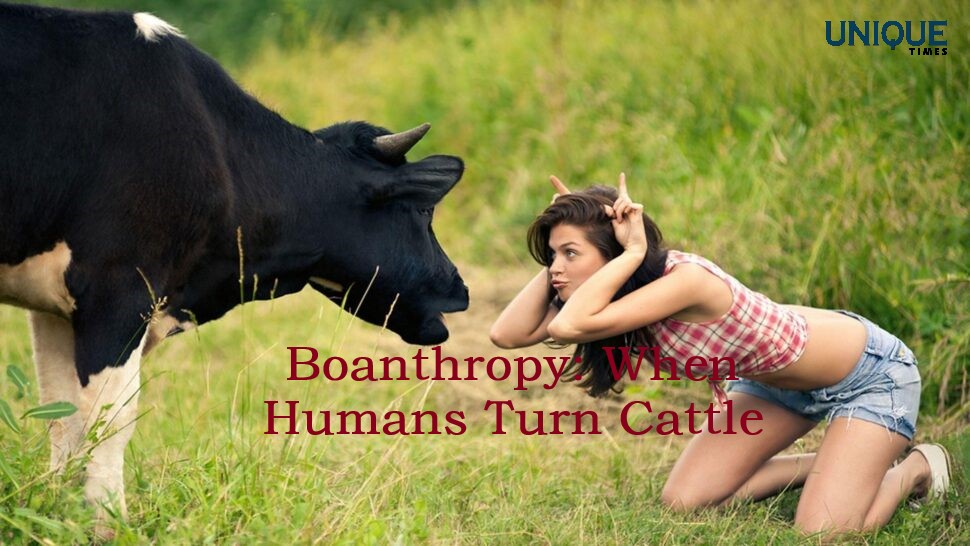Boanthropy: When the Human Mind Becomes Cattle

Human psychology is a complex and fascinating subject, encompassing a vast array of mental conditions and disorders. One of the lesser-known and more peculiar conditions is Boanthropy, a rare psychological illness in which individuals believe they are cows or oxen. In this blog, we will delve into the enigmatic world of Boanthropy, exploring its symptoms, potential causes, historical context, and treatment options.
Understanding Boanthropy
Boanthropy, a term derived from the Greek words “bous” (meaning “ox”) and “anthrōpos” (meaning “human”), is a psychological disorder classified under the broader category of delusional disorders. People affected by Boanthropy genuinely believe they have transformed into cows or oxen, leading them to imitate the behavior of these animals.
Symptoms of Boanthropy
- Behavioral Imitation: Those suffering from Boanthropy will begin to adopt the physical actions and mannerisms of cows or oxen. They may walk on all fours, eat grass, moo or make similar vocalizations, and even avoid human interaction.
- Loss of Human Identity: The affected individuals may show a complete disconnect from their human identity, refusing to recognize their human characteristics or personal history.
- Distorted Perception: They might perceive their environment through the lens of a cow or ox, interpreting human objects as things relevant to their imagined bovine identity.
- Social Isolation: As Boanthropy progresses, individuals may become isolated from their friends, family, and society due to their erratic behavior.
Causes of Boanthropy
The exact causes of Boanthropy are still not fully understood, as it is a rare and complex condition. However, there are some theories that attempt to explain its origins:
- Psychological Trauma: In some cases, Boanthropy has been linked to severe psychological trauma or stress. The mind, as a coping mechanism, might adopt an alternate identity to escape from the painful realities of life.
- Cultural and Historical Influences: In ancient civilizations, legends and myths involving shape-shifting humans might have contributed to the emergence of Boanthropy. These beliefs could have influenced vulnerable individuals to assume the identity of animals.
- Neurological Factors: Certain neurological conditions or imbalances in brain chemicals might trigger delusions and cause individuals to believe they are animals.
Historical Perspectives
Boanthropy has been mentioned in historical texts and folklore from various cultures. Ancient Greeks, Egyptians, and Native American tribes are among those who referenced stories involving humans transforming into animals as a form of divine punishment or magical transformation. These narratives could have laid the groundwork for the development of Boanthropy as a psychological disorder in later times.
Treatment Options
Treating Boanthropy requires a multidisciplinary approach involving psychiatrists, psychologists, and potentially neurologists. The main goal is to help patients regain their sense of self-identity and eliminate the delusions associated with their bovine identity. Therapeutic techniques may include:
- Cognitive Behavioral Therapy (CBT): CBT helps patients challenge and reframe their irrational beliefs, focusing on grounding them in reality.
- Medication: In some cases, antipsychotic medication might be prescribed to manage delusions and hallucinations.
- Supportive Care: Patients benefit from a supportive and understanding environment to aid in their recovery and integration back into society.
Conclusion
Boanthropy, though rare, is a fascinating psychological disorder that sheds light on the intricacies of the human mind. By exploring its symptoms, causes, historical context, and potential treatments, we gain a deeper understanding of how our perceptions and beliefs can be altered by psychological conditions. Awareness and empathy toward individuals suffering from Boanthropy can lead to early intervention and better outcomes in their journey to reclaim their human identity.
Picture Courtesy: Google/images are subject to copyright








